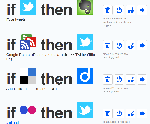 If you're looking for a handy, no frills book of suggestions for blogging, this book should meet your requirements. Having been designed as an email course, 30 Day Blogging Challenge, written by Nikki Pilkington, consists mainly of 30 very short articles on different aspects of blogging. Being able to buy the whole lot in the form of a book is excellent for those of us for whom deferred gratification is an alien concept.
If you're looking for a handy, no frills book of suggestions for blogging, this book should meet your requirements. Having been designed as an email course, 30 Day Blogging Challenge, written by Nikki Pilkington, consists mainly of 30 very short articles on different aspects of blogging. Being able to buy the whole lot in the form of a book is excellent for those of us for whom deferred gratification is an alien concept.
9 Reasons to attend BETT 2012
 Well, here we are again. It will soon be Christmas, and just as we're all hoping to have started to recover from over-eating and over-imbibing (not me though: I'm being sensible!), it's the BETT show. Said to be the largest educational technology show in the world, it's gruelling but also exciting. IF you can get to it, do so -- and if you can't think of why you'd want to, you're in luck, because that's what this article is all about.
Well, here we are again. It will soon be Christmas, and just as we're all hoping to have started to recover from over-eating and over-imbibing (not me though: I'm being sensible!), it's the BETT show. Said to be the largest educational technology show in the world, it's gruelling but also exciting. IF you can get to it, do so -- and if you can't think of why you'd want to, you're in luck, because that's what this article is all about.
There are at least 9 good reasons to attend BETT, these being to:
Review of Problogger’s Guide To Blogging For Your Business
 Before looking at the book, written by Mark Hayward, in detail, it’s worth pointing out what the book is, and is not. It is, as the title implies, concerned with blogging in order to promote your business. It is not about blogging as a business in itself. It’s an important distinction, not least because once we take money out of the equation then “business” can be used as shorthand for any type of enterprise, including a charity, a cause – and a school.
Before looking at the book, written by Mark Hayward, in detail, it’s worth pointing out what the book is, and is not. It is, as the title implies, concerned with blogging in order to promote your business. It is not about blogging as a business in itself. It’s an important distinction, not least because once we take money out of the equation then “business” can be used as shorthand for any type of enterprise, including a charity, a cause – and a school.
A week to remember
Collabor8 4 Change at BETT 2012
 We had a fantastic three hours at Collabor8 4 Change at Havering on the 17th November. Variety is the spice of life, so with 56 topics to choose from in total, everyone was catered for. To give you a flavour of the event, below is a selection of the talks and discussions featured. Now, if you are feeling really devastated that you were not able to be there, we have two bits of good news.
We had a fantastic three hours at Collabor8 4 Change at Havering on the 17th November. Variety is the spice of life, so with 56 topics to choose from in total, everyone was catered for. To give you a flavour of the event, below is a selection of the talks and discussions featured. Now, if you are feeling really devastated that you were not able to be there, we have two bits of good news.Computers in Classrooms 3D Edition!
Found on the web: 11/28/2011 (a.m.)
Found on the web: 11/25/2011 (a.m.)
-
Learning with 'e's: A convenient untruth
Good analysis of the myth of learning styles. Wheeler argues that a lack of critical evaluation of theory (or, in this case, what I would call "conventional wisdom") is the teacher's biggest enemy.
-
How to Turn Your iPad Into the Ultimate Writing Tool | iPad.AppStorm
interesting round-up of apps for writing on an iPad.
What do walls mean to you?
Here's a nice blast from the (not-too-distant) past:
Found on the web: 11/22/2011 (p.m.)
-
Interesting approach to encouraging teachers to use technology in their teaching, specifically Web 2.0. It is similar to what some teachers told me about how they encourage their colleagues to use interactive whiteboards more effectively, whilst I was doing research for an article recently.
An experiment with randomly-generated links
Blogging by email via a phone
2 days to go, 1 day to go
Found on the web: 11/14/2011 (a.m.)
-
Blogging and tweeting as a collaborative writing engagement
Interesting ideas here, including use of a projector. I like the way the class is enjoying the work of other schools, and the way they collaborate in their responses.
The importance of not being nice
 The trouble with being too nice when commenting on something is that sometimes the underlying message just doesn’t get through. This applies whether you’re looking at students’ work, observing trainee teachers or evaluating a school’s ICT provision.
The trouble with being too nice when commenting on something is that sometimes the underlying message just doesn’t get through. This applies whether you’re looking at students’ work, observing trainee teachers or evaluating a school’s ICT provision.
Don’t get me wrong: I’m not advocating going in guns blazing, being really negative or thoroughly obnoxious. But if you don’t point out the shortcomings in whatever it is you’re looking at – or, at least, ask the sort of questions that will lead them to realise them for themselves – then really you’re not being nice, you’re being dishonest.
Are there benefits in having an unread blog?
Planning an ICT Co-ordinators' Day
If this, then that
 Here’s a web application that’s potentially very useful. IFTTT lets you create your own automated actions using a range of social networking tools. I’ve been messing around with it only for about an hour, so I haven’t thoroughly explored all it has to offer, but already I can see it will prove to have been an excellent investment in time.
Here’s a web application that’s potentially very useful. IFTTT lets you create your own automated actions using a range of social networking tools. I’ve been messing around with it only for about an hour, so I haven’t thoroughly explored all it has to offer, but already I can see it will prove to have been an excellent investment in time.
The logic of the way it works is as follows:
Found on the web: 11/06/2011 (p.m.)
-
Artificial intelligence: Difference Engine: Luddite legacy | The Economist
interesting article about the economic effects of technological change
